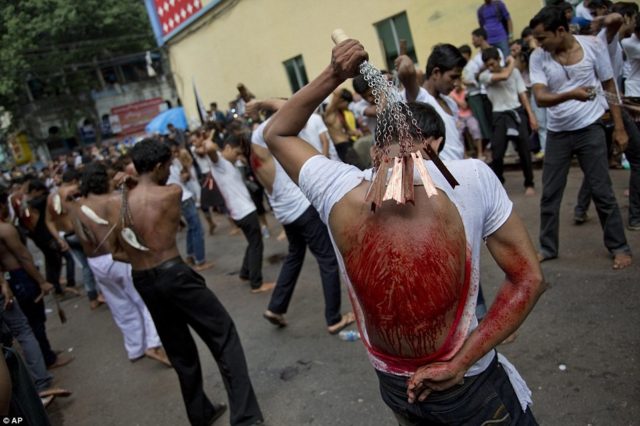Muharram marks the start of the lunar Hijrah calendar. It is the most important month in the Muslim calendar, after Ramadan. Muharram is marked by a lot of religious practices, one of them being Tatbir – the practice of striking the head or the back using a sword or knife until one starts to bleed.
Significance Of The 10th Day Of Muharram
The 10th day of Muharram, known as Ashurah is one of the most significant days in the month. Ashura marks the day when Allah saved Holy Prophet Musa and drowned the Pharoh in the Red Sea. It is because of this that Muslims fast on the day of Ashurah, though it is not obligatory.
In Islamic history, the event of Karbala is one of the most tragic events. Coincidently, this too had occurred on the 10th day of Muharram. It is till today that people mourn the event, and thus the practice of Tatbir began.
Tatbir – Practised Mainly By Shias
Tatbir is performed mainly by the Shias because it was the Battle of Karbala that shaped the very ideologies of the Shia sect. People offer prayers, after the practice of Tatbir, in clothes that are soaked in their blood. All the blood shedding is in the name of Imam Husayn commemorating his sufferings during the battle. His death is considered to have helped Shias in distinguishing the right from the wrong.

However, this is a practice that people have made a practice over the years, even though the Prophet has forbidden them to hold mourning ceremonies for the deceased.
It is important to understand that practices like Tatbir, in their worst forms, can lead to loss of life, and this is definitely not supported by the Indian Constitution, either.
Article 21 Of The Indian Constitution
Article 21 of the Indian Constitution revolves around the concept of the right to life. It reads:
“Protection of Life and Personal Liberty –No person shall be deprived of his life or personal liberty except according to procedure established by law.”
The article covers almost all aspects of human rights, but the right to die is unconstitutional. Any attempt to end one’s life is punishable under Section 309 of the Indian Penal Code.
It is very difficult to understand how the Indian government conveniently chooses to ignore issues and practices that it can tackle. On one side, with its elaborate reservation system the Indian government tries to provide the minorities with privileges that should, in reality, be earned, but on the other side, it just lets them dig their own graves. We need to realise that such practices tend to grow in almost all religions, and have no religious backing to it.
The government cannot completely ban a practice, but it needs to realise that it has the power and the force that need to be used not during significant protests, but when practices of self-harm are performed right in the open. Practices like these not only undermine the value of life, but also comment on the ideologies that seem to be propagated by a religion. These are important issues that the government should actually intervene into because not only do they affect how one religion sees another, but also influence the unity and harmony in the country.
We do not wish to harm the sentiments of any sect, but a practice that is unconstitutional, dreadful, and moreover is not even supported by the texts of the religion, should not be encouraged.
You May Also Like:
http://edtimes.in/2016/06/incredible-india-ambubachi-mela-celebrates-menstruating-goddess/































